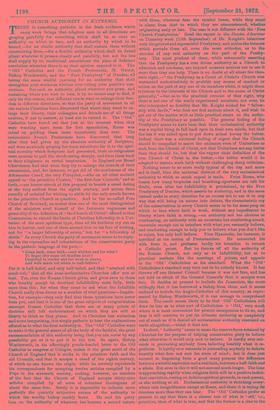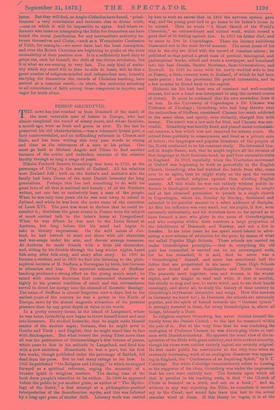CHURCH AUTHORITY IN EXTREMIS. T HERE is something pathetic in the
fresh evidence which every week brings that religious men in all directions are groping painfully for something which shall be at once an
authority on which to lean, and no authority by which to be bound, —for an elastic authority that shall sustain them without constraining them,—for a flexible authority which shall be found pliant wherever it presses closely and painfully, but not the less shall supply by its traditional associations the place of deficient conviction wherever there is no clear opinion opposed to it. The " Old" Catholics and the French Protestants, M. Guizot, Bishop Wordsworth, and the " Free Presbytery" of Dundee, all
betray the same wistful yearning for an authority that shall strengthen your weakness without over-ruling your positive con- victions. But such an authority, pliant wherever you press, and sustaining where you wish to lean, is by no means easy to find, if only for this reason, that different minds want to enlarge their free- dom in different directions, so that the party of movement in all
the various Churches have discovered that where they want to en- large their liberty, their colleagues and friends are of all things anxious, if not to narrow, at least not to extend it. The " Old " Catholics have found out that just at the moment when they were wanting more room for free speculation, Rome was intent on guiding them more imperiously than ever. The rationalistic French Protestants have discovered that long after they had given up the absolute authority of Scripture, and were anxiously groping for some substitute for it in the spiri- tual morality which Scripture had generated, their co-religionists were anxious to pull the check-string sharply, and force them back to their allegiance to verbal inspiration. In England our Broad Churchmen find that when they try to enlarge the bounds of their communion, and, for instance, to get rid of the anathemas of the Athanasian Creed, the very Puseyites,—who on all other matters appeal to the primitive Church,' the first four Councils,' and so forth,—are horror-struck at this proposal to banish a creed dating at the very earliest from the eighth century, and accuse them roundly of unbelief for wishing to abide by the only creeds known to the primitive Church in question. And in the so-called Free Church of Scotland, no sooner does one of the most distinguished of the ministers avail himself of the fortunate vagueness and
generality of the definition of " the Church of Christ" offered in that Communion, to extend the limits of Christian fellowship to a Uni- tarian of the most spiritual type, than all his brethren cry out on him in horror, and one of them accuses him to his face of wishing, not for " a larger fellowship of saints," but for " a fellowship of devils." In every Church the party of movement seems to be reply- ing to the reproaches and exhortations of the conservative party in the pathetic language of the poet,—
"Come back, come back,—and whither and for what ? To finger idly some old Gordian knot ? Unskilled to sunder and too weak to cleave, And with much toil attain to half-believe?
For it is half-belief, and only half-belief, and that "attained with much toil," that all the semi-authoritative Churches offer you at best. Yes, even the Roman Church gives, and gives even to those who humbly accept its doctrinal infallibillity most fully, little more than this; for when they come to ask what the Infallible Church really does decree on a number of vital questions—Inspira- tion, for example—they only find that these questions have never been put, and that it is one of the great subjects of congratulation amongst Roman Catholics that there are so many points of doctrine still left undetermined on which they are still at liberty to think as they please. And in Churches less audacious and more temporising, it is simply pathetic to hear the explanations offered as to what the final authority is. The " Old" Catholics want to make it the general assent of all the body of the faithful, the great recommendation of this authority being that you can never by any possibility get at it to put it to the test. So again, Bishop Wordsworth, in his affectingly puzzle-headed letter to the Old Catholics in congress at Cologne, makes it the great merit of the Church of England that it sticks to the primitive faith and the old Councils, and that it accepts a creed of the eighth century, of which no one knows the origin, while he severely reprehends his correspondents for accepting twelve articles compiled by a Pope in the sixteenth century, making, however, no mention of the fact that the Church of England accepts thirty-nine articles compiled by all sorts of volunteer theologians of about the same date. Surely it is impossible to indicate more perfectly the quaintly subjective nature of the authority to which the worthy bishop meekly bows. He and his party lean on the authority of whatever has become a second nature
with them, whatever date the symbol bears, while they recoil in alarm from that to which they are unaccustomed, whether originating early or late. The case is not different with the 'Free Church Presbyteries.' Read the report in the Dundee Advertiser on Thursday week (12th September) of Mr. Knight's interview with his grieved and reproachful Presbytery, and notice the tremors which pervade them all, even the most orthodox, as to the exercise of any real authority on the part of the Presby- tery. The most prudent of them, while vehemently asserting that the Presbytery has a true divine authority as a Church to admonish and condemn, are beyond measure anxious not to use it more than they can help. There is no doubt at all about the theo- retic right,—" the Presbytery as a Court of Christ's Church was warranted authoritatively to prohibit any course of conduct or action on the part of any one of its members which it might deem injurious to the interests of the Church and to the cause of Christ generally,"—but as to the practical exercise of that right, why there is not one of the really experienced members, not even he who interjected so forcibly that Mr. Knight wished for "fellow- ship with devils," who does not feel anxious about it, and wish to get out of the matter with as little practical strain on the autho- rity of the Presbytery as possible. The general feeling of the Presbytery seems to have been that their ecclesiastical authority was a capital thing to fall back upon in their own minds, but that the less it was called upon to put down actual heresy the better. Indeed there was a universal feeling of regret that the Church should be compelled to assert the exclusion even of Unitarians as such from the Church of Christ, not that Unitarians are any better than they should be, but that the vaguer their definition of the true Church of Christ is, the better,—the better would it be adapted to sustain weak faith without challenging sharp criticism. Nothing seems to us more really typical of the day and more sad in itself, than the universal distrust of the very ecclesiastical authority to which so much appeal is made. From Rome, who boasts how many loopholes and breathing-apertures are left for doubt, even after her Infallibility is proclaimed, to the Free Presbytery of Dundee, which asserts its authority, and in the same instant seeks in every direction for an excuse not to use it in any way that will bring its nature into debate, the characteristic cry of the conservatives in every Church seems to be for some prop on which to lean where faith is weak, without any impediment to liberty where faith is strong,—an authority not too obvious or overbearing, an authority with an uncertain but comforting sound, uncertain enough not to interfere with what you earnestly believe, and comforting enough to help you to believe what you don't like to reject, but only half-believe. Pere Hyacinthe, for instance, is horrified at the notion of Protestantism. He converted his wife from it, and professes loudly his intention to remain a Catholic priest. But he throws off all the authority of the Roman Church, not only as to Infallibility, but as to practical matters like the marriage of priests, and appeals to the ' Old' Catholicism as his standard. What the ' Old' Catholicism's standard may turn out to be nobody knows. It has thrown off one General Council because it was not free, and has not told us which of the General Councils that it accepts were free. It decides at present to include the Jansenists, the more willingly that it has borrowed a bishop from them, and it seems inclined to include the Anglo-Catholics of this country, as repre- sented by Bishop Wordsworth, if it can manage to comprehend them. The result seems likely to be that ' Old' Catholicism will draw its line as to what sort of Catholicism is ' Old,' very much where it is most convenient for present emergencies to do so, and that it will contrive to put its ultimate authority as completely out of reach as if it denied all ecclesiastical authority exercised on earth altogether,—which it does not.
In short, Authority' seems to mean the reserve force retained by Churches for the purpose of helping conservative piety to believe what otherwise it would only wish to believe. It hardly ever suc- ceeds in preventing anybody from believing heartily what it re. pudiates. It hardly ever succeeds in persuading anybody to believe heartily what does not suit his state of mind ; but it does just succeed in disguising from a good many persons the difference between a wistful aspiration and a real faith, between a half-faith and a whole. But even in this it will not succeed much longer. The time is approaching rapidly when religious faith will be a positive indivi- dual conviction, resting on definite spiritual grounds, in each person, or else nothing at all. Ecclesiastical authority is shrinking every- where into insignificance except at Rome, and there it is trying its devotees more than they can bear. The Old' Catholics prefer at present to say that there is a clearer test of what is ' old,' i.e., primitive, than of what is true, and that the former is a clue to the
latter. But they will find, as Anglo-Catholics have found, primi- tiveness' a very roundabout and intricate clue to divine truth, —one on which it will be impossible to agree. And where re- formers who insist on interpreting the Bible for themselves can have found the moral justification for any intermediate authority be- tween themselves and Christ,—such as a Westminster Confession of Faith, for example,—we never have had the least conception, and even the Scotch Churches are beginning to quake at the utter untenability of their position now. It is a sufficiently hard duty to grope oat, each for himself, the drift of the divine revelation, but it is what we are coming to very fast. The only kind of autho- rity which any creed will in time be able to boast, will be that a great number of religious-minded and independent men, honestly studying for themselves the records of Christian teaching, have arrived at a common result,—in short, the authority attaching to all coincidence of faith among those competent to inquire, and eager for truth alone.



































 Previous page
Previous page